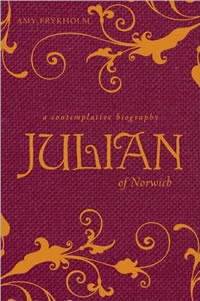Book Notes
 Amy Frykholm, Julian of Norwich, A Contemplative Biography (Brewster, MA: Paraclete Press, 2010), 147pp.
Amy Frykholm, Julian of Norwich, A Contemplative Biography (Brewster, MA: Paraclete Press, 2010), 147pp.
Her mother said that she asked too many questions. As a girl she had an insatiable desire to experience the love of God beyond the rituals of the church. She survived the plagues of 1349 and 1362 which decimated three-quarters of the population of Norwich on England's east coast. Then came the visions, "showings" or what she called the "ravings" during a period of sickness when she almost died. Although not a nun but a lay person who lived a "mixed life" in both the secular and sacred realms, she even had the temerity to ask the bishop to bless her plans to live as an anchoress in a tiny cell next to the church. He agreed, and so from there she read, prayed, dispensed spiritual wisdom, and for twenty years questioned and meditated upon her continuing visions.
Her ultimate act of audacity was not only to believe that God had truly spoken to her in her sixteen visions, and that the visions exceeded the limited wisdom of the church, but also that God intended for her to write them down in a book so that ordinary believers could benefit from them. This was the age of the Crusades, Chaucer, when John Wycliffe and the Lollards were martyred for religious transgression, and social conventions greatly restricted the acceptable roles for women. Nonetheless, today Julian of Norwich (1342–1416) is best remembered for having written the first book composed by a woman in English, A Revelation of Love. How her manuscript ever survived is part mystery and part miracle.
As Amy Frykholm shows in her short biography written for a general audience, Julian remains a "teacher for our times" who "reenvisoned the relationship between God and the soul." The challenge for any biographer of Julian is that we know very little about her life. We're not sure if she ever married. We don't know anything about her education. But in the hands of Frykholm, a staff writer for the Christian Century who earned her PhD from Duke University in literature, Julian springs to life even though she lived six hundred years ago. Julian's basic message was both simple and radical. In one vision Jesus spoke to her, "Lo, how I love thee." And so in one of my own favorite sayings, Julian advises us that "the greatest honor we can give almighty God is to live gladly because of the knowledge of his love."
Dan Clendenin: dan@journeywithjesus.net


